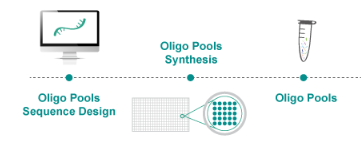In today's rapidly evolving digital landscape, the volume of global data is growing at an astonishing pace. From the vast amounts of content generated on social media to the data collected in healthcare and scientific research, traditional data storage methods are pushing the limits of storage density, energy consumption, and durability. Amidst this challenge, DNA-based information storage is emerging as a cutting-edge technology that promises to revolutionize the way we preserve data. DNA naturally boasts an extremely high storage density and stability, capable of storing vast amounts of information and remaining stable for millennia under extreme conditions. So, how do Oligo Pools support the development of this innovative data storage technology?
Why Choose DNA as a Data Storage Medium?
DNA stands out as one of the best carriers of information in nature. Theoretically, 1 gram of DNA can store over 200 petabytes (PB) of data—a storage density far surpassing traditional hard drives and Blu-ray discs. Moreover, DNA's exceptional durability allows it to be preserved for thousands of years in a cold, dry environment, making it ideal for long-term archiving. Additionally, DNA storage consumes minimal energy, significantly reducing the energy demands of modern data centers and positioning it as an excellent choice for green storage solutions.
The Crucial Role of Oligo Pools in DNA Data Storage
Oligo Pools, collections of short DNA sequences synthesized in parallel, are the cornerstone of DNA data storage. By generating numerous unique DNA sequences, Oligo Pools not only provide an efficient encoding method for DNA storage but also address the bottlenecks of traditional storage media in terms of capacity and flexibility.
1. The "Secret Weapon" for Data Encoding
In DNA storage, data is first converted from binary code (0s and 1s) into base sequences of A, T, C, and G. This process is accomplished through Oligo Pools, which divide data into small fragments and then synthesize millions of short DNA sequences. Each oligonucleotide chain represents a data fragment, and when combined, these fragments form a complete dataset. This encoding technique is the core value of Oligo Pools, enabling DNA storage to preserve massive amounts of data in minimal space.
2. Sophisticated Error Correction Mechanisms
A major challenge in DNA storage is error management. Traditional data storage systems ensure data integrity through redundancy and checksum techniques. In contrast, Oligo Pools address this issue by incorporating redundant sequences and error correction mechanisms. Studies have shown that, in combination with techniques like PCR, scientists can exclude non-target sequences during the reading process, achieving retrieval accuracy of over 99.9%. This technology not only benefits DNA storage but also supports the synthesis of gene fragments or data files, paving the way for future genome editing and data repair.
3. Efficient Data Retrieval Capabilities
The purpose of storing data is to effectively read and utilize it. In DNA data storage, the retrieval process relies primarily on DNA sequencing, and Oligo Pools enable targeted retrieval of specific sequences, making data extraction more efficient. By designing unique primer sequences, scientists can selectively retrieve specific data from a complex DNA pool, avoiding unnecessary sequencing resource wastage. This efficient retrieval capability not only enhances the practical value of DNA storage but also facilitates high-throughput scientific research.
How to Utilize Oligo Pools for Data Storage?
• Choose the Right Encoding Strategy
The density and error rate of DNA storage are greatly influenced by the encoding method. With flexible encoding schemes, Synbio Technologies can help optimize data storage efficiency and accuracy, ensuring the stability of data storage.
• Maintain Optimal Storage Conditions
While DNA is inherently stable, cold, dry, and light-protected storage conditions can extend its shelf life, ensuring that data remains intact over the long term.
• Focus on Scalable Production
As data storage demands grow, high-throughput Oligo Pool synthesis becomes increasingly important. Synbio Technologies, with extensive expertise, ensures the reliability and scalability of large-scale data storage.
Synbio Technologies’ Oligo Pool Synthesis Platform
Supporting the rise of DNA storage as a mainstream technology, Synbio Technologies’ Syno high-throughput synthesis platform utilizes inkjet technology to synthesize up to 890,000 oligonucleotide sequences in parallel on a chip, with a maximum length of 300 nt. During synthesis, each reaction site forms isolated microdroplets, preventing cross-contamination and ensuring high sequence accuracy and uniformity. Our customized synthesis services perfectly align with clients' downstream experiments and applications, such as sgRNA screening libraries, high-throughput sequencing, high-throughput gene synthesis, and synthetic biology, enhancing the efficiency of subsequent high-throughput screening and the success rate of long-fragment assembly.

References
Winston, C., Organick, L., Ward, D., Ceze, L., Strauss, K., & Chen, Y. J. (2022). Combinatorial PCR method for efficient, selective oligo retrieval from complex oligo pools. ACS Synthetic Biology, 11(5), 1727-1734.
 DNA Synthesis
DNA Synthesis Vector Selection
Vector Selection Molecular Biology
Molecular Biology Oligo Synthesis
Oligo Synthesis RNA Synthesis
RNA Synthesis Variant Libraries
Variant Libraries Genome KO Library
Genome KO Library Oligo Pools
Oligo Pools Virus Packaging
Virus Packaging Gene Editing
Gene Editing Protein Expression
Protein Expression Antibody Services
Antibody Services Peptide Services
Peptide Services DNA Data Storage
DNA Data Storage Standard Oligo
Standard Oligo Standard Genome KO Libraries
Standard Genome KO Libraries Standard Genome Editing Plasmid
Standard Genome Editing Plasmid ProXpress
ProXpress Protein Products
Protein Products
























